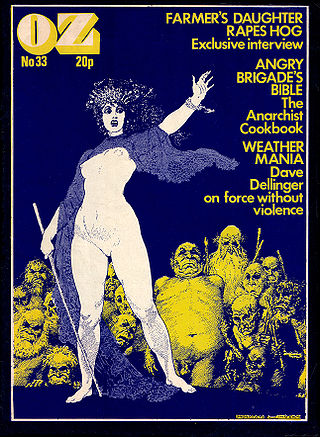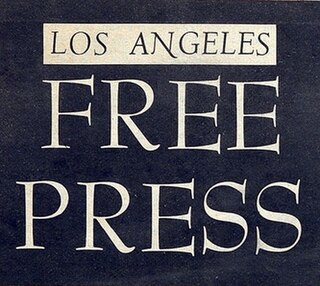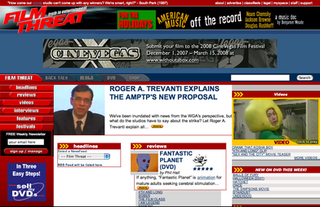
New Musical Express (NME) is a British music, film, gaming, and culture website and brand. Founded as a newspaper in 1952, with the publication being referred to as a 'rock inkie', the NME would become a magazine that ended up as a free publication, before becoming an online brand which includes its website and radio stations.
The Stage is a British weekly newspaper and website covering the entertainment industry and particularly theatre. It was founded in 1880. It contains news, reviews, opinion, features, and recruitment advertising, mainly directed at those who work in theatre and the performing arts.

The British counter-culture or underground scene developed during the mid 1960s, and was linked to the hippie subculture of the United States. Its primary focus was around Ladbroke Grove and Notting Hill in London. It generated its own magazines and newspapers, bands, clubs and alternative lifestyle, associated with cannabis and LSD use and a strong socio-political revolutionary agenda to create an alternative society.

The terms underground press or clandestine press refer to periodicals and publications that are produced without official approval, illegally or against the wishes of a dominant group. In specific recent Asian, American and Western European context, the term "underground press" has most frequently been employed to refer to the independently published and distributed underground papers associated with the counterculture of the late 1960s and early 1970s in India and Bangladesh in Asia, in the United States and Canada in North America, and the United Kingdom and other western nations. It can also refer to the newspapers produced independently in repressive regimes. In German occupied Europe, for example, a thriving underground press operated, usually in association with the Resistance. Other notable examples include the samizdat and bibuła, which operated in the Soviet Union and Poland respectively, during the Cold War.

Deccan Herald is an Indian English language daily newspaper published from the Indian state of Karnataka. It was founded by K. N. Guruswamy, a liquor businessman from Ballari and was launched on 17 June 1948. It is published by The Printers Mysore, a privately held company owned by the Nettakallappa family, heirs of Guruswamy. It has seven editions printed from Bengaluru, Hubballi, Davanagere, Hosapete, Mysuru, Mangaluru, and Kalaburagi.

The Oracle of the City of San Francisco, also known as the San Francisco Oracle, was an underground newspaper published in 12 issues from September 20, 1966, to February 1968 in the Haight-Ashbury neighborhood of that city. Allen Cohen (1940–2004), the editor during the paper's most vibrant period, and Michael Bowen, the art director, were among the founders of the publication. The Oracle was an early member of the Underground Press Syndicate.

The Los Angeles Free Press, also called the "Freep", is often cited as the first, and certainly was the largest, of the underground newspapers of the 1960s. The Freep was founded in 1964 by Art Kunkin, who served as its publisher until 1971 and continued on as its editor-in-chief through June 1973. The paper closed in 1978. It was unsuccessfully revived a number of times afterward.

John Henley Heathcote-Williams, known as Heathcote Williams, was an English poet, actor, political activist and dramatist. He wrote a number of book-length polemical poems including Autogeddon, Falling for a Dolphin and Whale Nation, which in 1988 was described by Philip Hoare as "the most powerful argument for the newly instigated worldwide ban on whaling." Williams invented his idiosyncratic "documentary/investigative poetry" style which he put to good purpose bringing a diverse range of environmental and political matters to public attention. His last published work, American Porn was a critique of the American political establishment and the election of President Donald Trump; its publication date was the day of Trump's inauguration. In June 2015 he published a book-length investigative poem about the "Muslim Gandhi", Khan Abdul Ghaffar Khan, Badshah Khan.
Rebel Youth is the bilingual magazine of the Young Communist League of Canada (YCL), published beginning in the late 1980s and relaunched in 2005. It seeks to "[offer] weekly pan-Canadian socialist perspectives on the youth and student movement across Canada and internationally."

Film Threat is an American online film review publication, and earlier, a national magazine that focused primarily on independent film, although it also reviewed videos and DVDs of mainstream films, as well as Hollywood movies in theaters. It first appeared as a photocopied zine in 1985, created by Wayne State University students Chris Gore and André Seewood. In 1997, Film Threat was converted to a solely online resource.
Ireland on Sunday was a national Sunday newspaper published in Ireland from September 1997 until September 2006, when it was renamed the Irish Mail on Sunday. The newspaper was founded in 1996 as a sports-only newspaper called The Title, but was soon expanded into a general broadsheet Sunday newspaper with its founder, former County Meath Gaelic football player Liam Hayes, carrying on as editor. The paper was considered a 'middle-market' publication.

The London Magazine is the title of six different publications that have appeared in succession since 1732. All six have focused on the arts, literature and miscellaneous topics.
France Soir was a French newspaper that prospered in physical format during the 1950s and 1960s, reaching a circulation of 1.5 million in the 1950s. It declined rapidly under various owners and was relaunched as a populist tabloid in 2006. However, the company went bankrupt on 23 July 2012, before re-emerging as an online-only media in 2016. In 2020, according to NewsGuard, this media "fails to adhere to several basic journalistic standards".

Transatlantic Review was a literary journal founded in 1959 by Joseph F. McCrindle, who remained its editor until he closed the magazine in 1977. Published quarterly, at first in Rome and then in London and New York, TR was known for its eclectic mix of short stories and poetry—by both young, previously unpublished writers and prominent authors such as Samuel Beckett, Iris Murdoch, Grace Paley and John Updike—as well as drawings, essays, and interviews with writers and theater and film directors.
Michael John Lesser was a mathematical philosopher and political activist.

Building is one of the United Kingdom's oldest business-to-business magazines, launched as The Builder in 1843 by Joseph Aloysius Hansom – architect of Birmingham Town Hall and designer of the Hansom Cab. The journal was renamed Building in 1966 as it is still known today. Building is the only UK title to cover the entire building industry.
Harry Fainlight (1935–1982) was a British/American poet associated with the Beats movement.

San Francisco Express Times was a counterculture tabloid underground newspaper edited by Marvin Garson and published weekly in San Francisco, California from January 24, 1968, to March 25, 1969, for a total of 62 issues, covering and promoting radical politics, rock music, arts and progressive culture in the Bay Area. It was a member of the Underground Press Syndicate, and sold for 15 cents.
Stephen Irwin Abrams was an American scholar of parapsychology and a cannabis rights activist who was a long-standing resident of the United Kingdom. He is best known for sponsoring and authoring the full-page advertisement petitioning for cannabis law reform which appeared in The Times on 24 July 1967.

Gonzo Today is an internet-based publication inspired by the writing and reporting style of gonzo journalism popularized by Hunter Thompson.
















